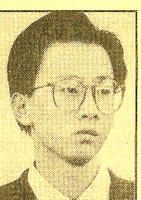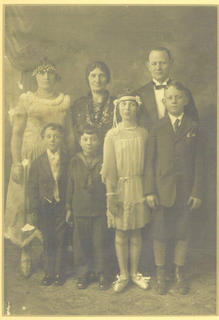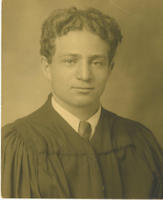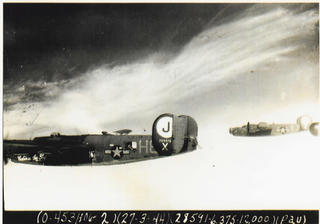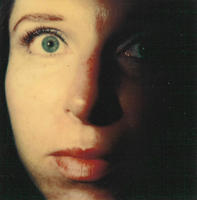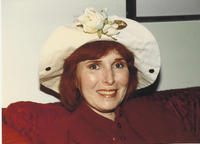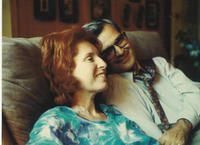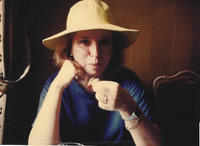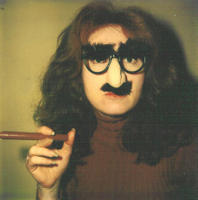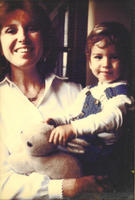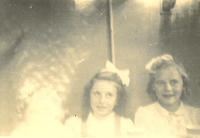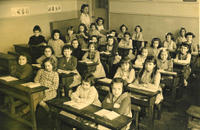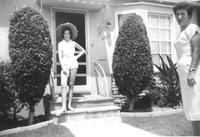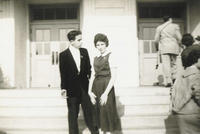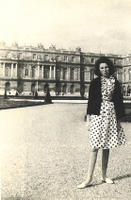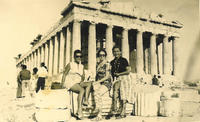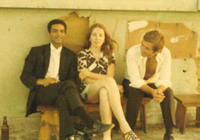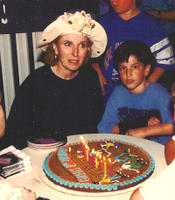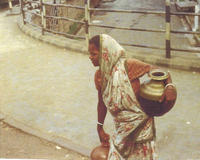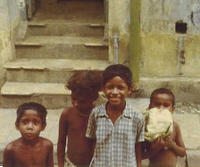Today we began what was supposed to be a three day weekend trip a day late. Jon had business to attend to on Saturday, so we had to wait and shorten our sights a bit. Last night was the usual late one and we got our usual late start with a big “brunch” of pancakes at Dorothea’s. We arrived at the Piraeus pier at 4 o'clock and waited for the ferry.
We were almost alone on the ferry. Jon’s VW bus was the only vehicle on board. Aegina is one hour or so from Piraeus, thus a busy weekend spot for Athenian tourists. The sky was moody and the air cool without the hidden sun. We strolled along the thoroughfare lined with cafés, restaurants and souvenir shops facing a small marina. We ate some octopus and shrimp with ouzo and found a small hotel for Bijou and myself.
After a walk up winding streets, ogling the old white washed houses with their fascinating styles of shutters and eaves and clean lines, we drove out of the town and found a small taverna open. We had dinner and a couple of liters of retsina and were in a talkative mood. Dorothea warmed up considerably and we ended the evening giggling and joking while talking to one of the owners – feeling far superior to mere tourists.
 21 October Monday Aegina
21 October Monday AeginaOur hotel (where the woman spoke good English after 10 years in Australia) was on a back street but our rooms on the third floor had a lovely view of the marina and the large church across the street with a quaint steeple with a very loud bell that gonged every half hour. We were awakened by the sound of hammering above our heads at 8 a.m.
Finally we went exploring the island – up a hill to a small church and a view of Athens – even to seeing the Acropolis in the distance and the sea (where the Athenians defeated the Persian fleet ... before we arrived) – then to the ruins of the local temple. We all got along well and had a splendid day.
Back in the town, the wind had whipped up tremendously and the little sailboats and even larger ones were bobbing at their moorings, halyards clanking against swaying masts. We discovered that no car ferry could cross in these heavy seas, so Jon & Dorothea & Meg took the people ferry back. Bijou and I bought food and parked the bus in the most sheltered spot we could find, ate, played scrabble by the light of the lamp post and snuggled to bed by 8 p.m. The wind whipped trees and whistled and rocked the bus, we made love to the rhythm, slept in our arms like infants.
22 October Tuesday Aegina to AthensWe awoke at 8, to find a line of trucks waiting for the ferry. It came on time and we were the last on – after the ride back – the first off. We made our way from Piraeus to Athens and crawled in the traffic making our way back by our simple (printed) map, unreadable street signs and looking at the Acropolis as a landmark (the Parthenon faces exactly East / West).
Somehow we made it back to Jon's flat in Aghia Paraskevi, bought some food and ate it, and spent the rest of the afternoon washing clothes and listening to the wind as it blew our clothes off the roof top wash line.
Jon & Dorothea finally arrived and we went out to yet another new taverna, the
Rocky Mountain Oyster Taverna. The Americans living here have not mastered Greek names, so streets and restaurants are known by their characteristics:
The Flukes Taverna on Aegina is decorated by fish fins;
Pepsi Road is a main drag which has a Pepsi billboard.
Democritus Road I did not catch why. As Dorothea said, it is somewhat shameful they have not bothered to learn the language, living in Greece for two years and not learning more than a few phrases; all the Americans here denigrate the locals for their laziness, the silly bureaucratic regulations, their “un-American-ness.”
23 October Wednesday Athens to Korinth to Mikini to Napflion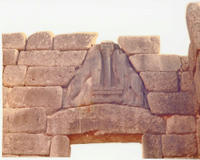
Freedom at last. We picked up our rental car last night, a Bug, and after a false start and detour to obtain our (forged) student cards we were on our way. We made it through Athens along the coast of the Aegean on the other side of Piraeus, ugly with oil refineries and junk yards and beautiful with glistening blue water and winding road through olive orchards. We wound through small towns and over the Korinth Canal – just a very deep ditch – and into ancient Korinth with its lively ruins of the ancient city.
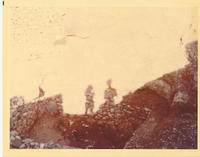
After moaning over the high prices of a few tourist shops, we drove again, through green country to Mikini (Mycenae) and up to magnificent, darkly primitive ruins of the Mycenaean civilization that flourished 800 years before the Parthenon was built. The entire Argolis valley lay below. We continued on to Napflion and ended at a youth hostel which is new, modern, with fine facilities --- and empty. As is the town – more so because there is a football (soccer, of course) game which many locals watch in the tavernas around the town. Summertime the place swings, I’m sure, but now it is like a ghost town, eerily still.
Seems like throughout our trip we either hit big crowds or empty towns. Somewhere there must be a happy medium.
 24 October Thursday Napflion to Epidavrus to Napflion to Tiryns to Argos to Olymbia
24 October Thursday Napflion to Epidavrus to Napflion to Tiryns to Argos to OlymbiaIt has been a perfect day, filled with wondrous surprises. First, we went to the theater of Epidavrus and picnicked in its stadium. We then visited ancient ruins at Tiryns, as old as the Mycenaean, marveling again at what they had accomplished. On to Argos, still more amazing ruins – Roman on top of Greek and a theater even bigger than the first one. From Argos it was a long upward climb through the Arcadian mountains with the fertile green farmland below. Finally a brief stop in Tripolis and then a tortuous, but breathtakingly beautiful three hour drive to Olymbia.

The images came fast and dazzling: sun over pine mountains, terraced farms on the mountainside, deep gorges between mountain ridges, all green and autumn orange and yellow. Villages set in steep slopes, its people apparently mountain goat nimble. White washed houses with red tile roofs, churches, bridges, a herdsman, or boy or woman with sheep or goats, horses, mules, donkeys, dogs all rushing or sauntering alongside the road, chickens trying to get to the other side; the sun behind the mountains, the sky darkening blue, the mountains green becoming gray, a river in dusky outline. The road then black and winding, through one-road towns and finally to Olympia, where it was said
man’s form was the most perfect and beautiful.
Bijou caught a snapshot of
my perfect form as I entered the arena, waving to the adoring crowds, and took my mark on the track and ran The Olympic Track. I won, of course.
25 October Friday Olympia to Patras to Arta & 26 October Saturday Arta to Ionnanina to Metsovon...
A land of contrasts ... picturesque ... breathtaking ... verdant ... West meets East... Travel brochure lingo with which we have been drenched. Clichés to be sure but so often accurate. The superlatives seem to be true and as we bend away from the latest mountain zig, leaving us only able to gush “
beautiful ... incredible ... fantastic...” Bijou scarily terrified at my constant “Look at that” while I steer past the
incredible, fantastic and beautiful scenery, the
verdant mountain slope with the
picturesque quaint village houses clinging at breathless angles above the ...
verdant farmland ... etc. as our rented VW Bug ticks around the next zag ...
As for the
land of contrasts, how about this: as I am writing this we are in Metsovon, a
picturesque town (of course—there aren’t any other kind in this travel land) 5000 feet up in the Pindus Mountains in Central Greece. The wind whips around the side of the mountain on which slope our room in a private house clings at a
breathtaking angle and we can’t wear enough layers of clothing to keep warm—we have some sweaters and light coats and wear all of them and are still cold. Two days ago we sweated our way across the archeological ruins of the
sun drenched Peloponnese.
On Friday we left Olympia and drove to Patras, then cross on the ferry to Arta, stopping only for food, gas and a misadventure over textiles in a small swampy coast town, Etolikan. Arta was up in the hills, reached by coursing more scenic, if not breathtaking (as was the road to Olympia truly b/t) country. Another cold water shave and we hopped to Ionnanina, in the hills, but warm at midday, a bustling city, modern in a provincial way.
We toured a cavern at Perama, picnicked overlooking a lake and continued through mountains on a rocky, winding road, climbing steeply past
verdant valley after
picturesque village. Finally a last squirmy climb and we were here in Metsovon where the ski season is one month away, where women wear Swiss or German costumes, men wear alpine gear; where Oriental Turkish and Venetian style architecture and Byzantine churches can be found—that’s right,
East meets West— and where every hotel in town is full up, and where we lie huddled in a
picturesque non-insulated room, our
breath taken, incredible-ly cold, our noses a
beautiful shade of red.
27 October Sunday Metsovon to Meteora to Trikkala to LamiaOur weather, which held firm, sunny, even as we climbed to the frigid air of Metsovon, broke. We shivered as we dressed in all our warmest clothes and left our room to greet a cold, rainy morning.
We climbed the slippery rock steps to our car and drove through the village, stopping only to buy a piping hot fresh bread and salami. We carefully threaded through the streets filled with church goers. The road wound back through the mountain still rising snakily through the morning fog. The rain became sleet and coated the windshield of our heaterless car. We munched on the moist hot bread which Bijou kept on her lap for its warmth.
In an hour the road twisted down into another valley and soon the rain eased, though the day continued gray and cold. The view maintined its beauty, though, the fall colors startlingly vivid, saturated under the gray light. We went on and by midday were crossing the plain to the Meteora Rocks. The monastery clings to the tops of the towering pillars arrogantly and independently.
On to Trikkala on a sleepy Sunday afternoon where we bought a long haired wool Flakati rug, which has yet to be made for us—trust and trepidation. Across a flat plain we headed south to Lamia. The town was jumping and we joined the strollers and watched a movie.
28 October Monday “Oxi Day” Lamia to DelfiIt is “Oxi Day” (x pronounced “ch” as in “la chaim”), a national Greek holiday, celebrating the 1825 war of independence against Turkey in which a Greek general when asked to give up said “Oxi, No.” Sort of like the WWII American general, McAulifffe, who answered a German surrender demand during the Battle of the Bulge: “Nuts.”
All during our trip, flags have been draped and signs of celebration appeared. This morning I awoke to sounds of band music from the square. When we got there it was jammed with people around the statue of a soldier. Officials, dignitaries and their wives, a priest and soldiers held a prayer and laid a wreath. A parade began.
The sun once again was warming and we started on our way to Delfi. On the way through mountains we wended through the Pass of Thermopylae and crossed the Plains of Thessaly and onto the Sacred Plain, olive groves stretching across its broad valley between the mountains.
Again, for the umpteenth time the road began to twist upward into mountains, lush green slopes. Finally we crossed into the town of Delfi. We found a room and walked to the museum, crowded with Oxi Day weekend tourists. Its gem, The Charioteer, impressed us as Olympia’s Hermes / Dionysus had not. We coursed the ruins of the treasuries and temples again marveling at the complex richness of what was. We asked the Oracle about our future and kissed to seal a promise of what will be.
29 October Tuesday Delphi to AthensWe awoke to another dreary rainy morning, the type of chilled to the bone days we had better get used to this winter.
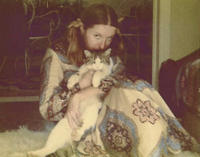
We returned to Athens and Jon’s house as if it were our own, anxious to wash ourselves and our clothes. I was also desirous of reading a newspaper. Though not reliant on my daily dose of news and sports, I do find I miss living without some news. Tonight Jon and I buried ourselves in the last few days’ Stars and Stripes for an hour while Bijou played with
Nike, Dorothea's cat.
Picking up political and sports news as rumors or as follow up news stories is somewhat disconcerting. You pick up a Tribune and an article headlined “Former President Nixon Recovering After Surgery” stares at you. This can be quite a shock if you hadn’t heard about his resignation or blood clot. On the sports page you see “Ali May Forestall Retirement To Defend His Championship.” If I hadn’t been lucky enough to conquer the static for a few minutes and get Armed Forces Radio, that would have been indecipherable. It has been three months. But I guess some things do change.
Did they ever find Patty Hearst?
30 October Wednesday Through 6 November Wednesday Athens 30 October: There was a full moon tonight at exactly 2100 hours Athens time.
For the two weeks we have been in Greece I have carefully studied the phases of the moon, my heart quickening as it showed first a sliver, then a crescent, a quarter, a half, then gibbous. Last night watching it rise, almost full fledged and I knew tonight would be the night.
Today while chore-ing in Athens: returning the rental car, changing money— I dropped in at the National Tourist Office and confirmed what I knew: the full moon was tonight and so the Acropolis would be open to allow visitors the monthly pleasure, if cloudless, to trod the stones in the full moon light.

So we gobbled 3 pizzas and drove downtown. We climbed the hill and arrived at 8 p.m., long after dark, the moon a perfect round silver plate above the sacred hill which the Gods aimed down so its light would bathe the white marble and cast long shadows of the Parthenon’s columns. As we reached the top, we found the entrance gate inexplicably closed. The others shot accusing glances toward me—it was my information relayed from the Ministry of Tourism relied upon.
Dumbfounded I merely pointed up to the moon, which seemed to be grinning mischievously. We scrambled toward the side entrance, still further up the hill. Its light was on, a guard inside. I heaved a sigh. But as we neared, we saw the gate was locked. Dorothea conversed in Greek and came away shaking her head.
“He says the full moon is not until 9 p.m.!”We stared upward, disbelieving but resigned to wait an hour after this latest example of bureaucratic brilliance. When finally let in, it was worth it and quite indescribable.
Meg cavorted over the stones, cartwheeling in the moonlight in the long shadows of the Parthenon. I wonder whether she will remember this distinction later in her life.
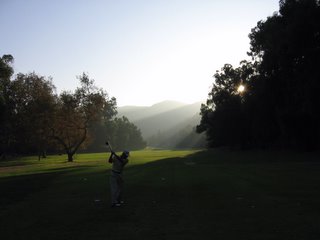 I love golf. The setting sun over the mountains. The cool November L.A. afternoon air. Oh, I admit that it is not really Nature. The courses at Griffith Park are Nature-lite, a manicured, sculpted, tamed, ersatz amusement park form of Nature. But it is wild enough to permit life lessons. Strangers at the first tee become pals by the 18th, like plane crash survivors on the brink of returning to civilization. This guy who joined us is Korean, and by the 18th tee we’re friends of a kind. We have commiserated in our mutual adversity, lost balls, sore feet. The shared experience has bonded us.
I love golf. The setting sun over the mountains. The cool November L.A. afternoon air. Oh, I admit that it is not really Nature. The courses at Griffith Park are Nature-lite, a manicured, sculpted, tamed, ersatz amusement park form of Nature. But it is wild enough to permit life lessons. Strangers at the first tee become pals by the 18th, like plane crash survivors on the brink of returning to civilization. This guy who joined us is Korean, and by the 18th tee we’re friends of a kind. We have commiserated in our mutual adversity, lost balls, sore feet. The shared experience has bonded us.







